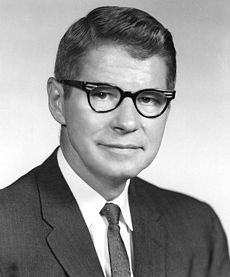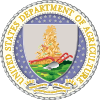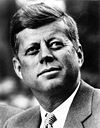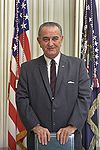- Orville Freeman
-
Orville Lothrop Freeman 
Orville L. Freeman Photograph in the John F. Kennedy Presidential Library and Museum, Boston. 16th United States Secretary of Agriculture In office
January 20, 1961 – January 20, 1969President John F. Kennedy
Lyndon B. JohnsonPreceded by Ezra Taft Benson Succeeded by Clifford M. Hardin 29th Governor of Minnesota In office
January 5, 1955 – January 2, 1961Lieutenant Karl Rolvaag Preceded by C. Elmer Anderson Succeeded by Elmer L. Andersen Personal details Born May 9, 1918
Minneapolis, MinnesotaDied February 20, 2003 (aged 84)
Minneapolis, MinnesotaPolitical party DFL Spouse(s) Jane C. Shields Alma mater University of Minnesota
University of Minnesota Law SchoolProfession Marine, politician Religion Lutheran Military service Service/branch USMC Rank Major Battles/wars World War II
* Battle of BougainvilleOrville Lothrop Freeman (May 9, 1918 – February 20, 2003) was an American Democratic politician who served as the 29th Governor of Minnesota from January 5, 1955 to January 2, 1961, and as the U.S. Secretary of Agriculture from 1961 to 1969 under Presidents John F. Kennedy and Lyndon B. Johnson. He was one of the founding members of the Minnesota Democratic-Farmer-Labor Party and strongly influential in the merger of the pre-DFL Minnesota Democratic and Farmer-Labor Parties. Freeman nominated Kennedy for President at the national Democratic Party convention.
Contents
Biography
Early years
Born in 1918 in Minneapolis, Minnesota, of Swedish and Norwegian ancestry, Freeman is best remembered for initiating the Food Stamp Program for under-resourced people which is still in use today.[1] Freeman was a 1940 graduate of the University of Minnesota, where he met his life-long friend and political ally, Hubert Humphrey, and his future wife and lifelong partner Jane Shields. During World War II, he served as a combat officer in United States Marine Corps, achieving the rank of major.
Marine Corps service
Figuring that the United States was going to be getting involved in World War II, Freeman signed up for the Marine Reserves in late 1940 with the understanding he could finish law school before fulfilling his required service. The attack on Pearl Harbor changed all that and on December 31, 1941 he received orders to report to Officer Candidate School at Marine Corps Base Quantico.[2]
After graduating OCS and follow training to be an infantry officer, he reported to Camp Elliot which was just outside of San Diego, California. He was soon assigned to the 9th Marine Regiment, Kilo Company, 3rd Battalion, 9th Marines. His unit eventually shipped out overseas for periods of training in New Zealand and Guadalcanal.[2]
On November 1, 1943 he saw his first combat when his unit came ashore at Torokina on Bougainville in what were the first battles of the Bougainville Campaign. A few days later, while leading a patrol, he came across a group of 5 or 6 Japanese soldiers in a clearing. Although he did shoot, he was also injured in the jaw and left arm. Eventually, he was evacuated to an Army hospital on New Caledonia and then to a Naval hospital on Noumea. He returned to the United States in 1944 but never recovered enough movement in his arm to pass a Marine Corps physical and return to combat.[2]
Post-war and governorship
He earned his LL.B. from the University of Minnesota Law School in 1946. Freeman went on to practice law in Minneapolis.[3] He ran unsuccessfully for attorney general of Minnesota in 1950 and for governor in 1952.[3]
Freeman was elected Governor in 1954, re-elected in 1956 and 1958, and after losing re-election in 1960 was appointed by President John F. Kennedy to serve as U.S. Secretary of Agriculture. As governor, Freeman took the unusual action of declaring martial law in the city of Albert Lea on December 11, 1959, to maintain law and order during a strike at the Wilson Packing Company. After twelve days, a federal court ruled that the Governor's imposition of martial law was inappropriate.[4] Also while serving as governor, on November 13, 1955, Freeman was a guest on the variety show Toast of the Town (which would later be called The Ed Sullivan Show).
After his service as Secretary of Agriculture, Freeman headed two consulting businesses and later practiced law in Washington, D.C.[3]
He died from complications of Alzheimer's disease in 2003 in Minneapolis, Minnesota.[3]
Legacy
His son Mike Freeman ran unsuccessfully for Governor in 1998, and has served non-consecutive terms as County Attorney for Hennepin County, Minnesota (1991 to 1999, and 2007 to the present).
Awards and decorations
Known decorations and medals include:


Purple Heart Asiatic-Pacific Campaign Medal w/ service star World War II Victory Medal See also
- List of notable United States Marines
Notes
- ^ [1]
- ^ a b c Berry (1982), p.149-162.
- ^ a b c d Stout, David (February 22, 2003). "Orville Freeman, 84, Dies; 60's Agriculture Secretary". The New York Times: p. B6. http://www.nytimes.com/2003/02/22/us/orville-freeman-84-dies-60-s-agriculture-secretary.html?pagewanted=1. Retrieved January 30, 2010.
- ^ "Martial Law Ordered in Meat Strike", Oakland Tribune, December 11, 1959, p1; "Court Ends Wilson Closure", December 23, 1959, p4
References
- Bibliography
- Berry, Henry (1982). Semper Fi, Mac – Living Memories of the U.S. Marines in World War II. New York, N.Y.: William Morrow and Company. ISBN 0-68814-956-1.
- Web
External links
- The Personal papers of Orville Freeman are available for research use at the Minnesota Historical Society.
- Oral History Interviews with Orville Freeman, from the Lyndon Baines Johnson Library
Political offices Preceded by
C. Elmer AndersonGovernor of Minnesota
1955 – 1961Succeeded by
Elmer L. AndersenPreceded by
Ezra Taft BensonUnited States Secretary of Agriculture
Served under: John F. Kennedy, Lyndon B. Johnson
1961–1969Succeeded by
Clifford M. HardinParty political offices Preceded by
Harry H. PetersonEndorsed Gubernatorial Candidate,
Minnesota DFL State Convention
1952, 1954, 1956, 1958, 1960Succeeded by
Karl RolvaagDFL nominee for Governor of Minnesota
1952, 1954, 1956, 1958, 1960Governors of Minnesota 
Territorial (1849–1858) 
State (since 1858) Sibley · Ramsey · Swift · Miller · Marshall · Austin · Davis · Pillsbury · Hubbard · McGill · Merriam · Nelson · Clough · Lind · Van Sant · Johnson · Eberhart · Hammond · Burnquist · Preus · Christianson · Olson · Petersen · Benson · Stassen · Thye · Youngdahl · E. Anderson · Freeman · Andersen · Rolvaag · LeVander · W. Anderson · Perpich · Quie · Perpich · Carlson · Ventura · Pawlenty · DaytonUnited States Secretaries of Agriculture 
Cabinet of President John F. Kennedy (1961–1963) Vice President Lyndon B. Johnson (1961–1963)
Secretary of State Dean Rusk (1961–1963)Secretary of the Treasury C. Douglas Dillon (1961–1963)Secretary of Defense Robert McNamara (1961–1963)Attorney General Robert F. Kennedy (1961–1963)Postmaster General J. Edward Day (1961–1963) • John A. Gronouski (1963)Secretary of the Interior Stewart Udall (1961–1963)Secretary of Agriculture Orville Freeman (1961–1963)Secretary of Commerce Luther H. Hodges (1961–1963)Secretary of Labor Arthur Goldberg (1961–1962) • W. Willard Wirtz (1962–1963)Secretary of Health, Education and Welfare Abraham A. Ribicoff (1961–1962) • Anthony J. Celebrezze (1962–1963)Cabinet of President Lyndon B. Johnson (1963–1969) Vice President None (1963–1965) · Hubert Humphrey (1965–1969)
Secretary of State Dean Rusk (1963–1969)Secretary of the Treasury Secretary of Defense Attorney General Postmaster General Secretary of the Interior Stewart Udall (1963–1969)Secretary of the Agriculture Orville Freeman (1963–1969)Secretary of Commerce Luther H. Hodges (1963–1965) · John T. Connor (1965–1967) · Alexander Buel Trowbridge (1967–1968) · C. R. Smith (1968–1969)Secretary of Labor W. Willard Wirtz (1963–1969)Secretary of Health, Education and Welfare Anthony J. Celebrezze (1963–1965) · John William Gardner (1965–1968) · Wilbur Joseph Cohen (1968–1969)Secretary of Housing and Urban Development Robert Clifton Weaver (1966–1968) · Robert Coldwell Wood (1969)Secretary of Transportation Alan Stephenson Boyd (1967–1969)Categories:- 1918 births
- 2003 deaths
- Cooperative organisers
- Governors of Minnesota
- United States Secretaries of Agriculture
- Minnesota Democrats
- Deaths from Alzheimer's disease
- University of Minnesota alumni
- University of Minnesota Law School alumni
- United States Marine Corps officers
- American military personnel of World War II
- American people of Norwegian descent
- American people of Swedish descent
- American Lutherans
- People from Minneapolis, Minnesota
- Lyndon B. Johnson Administration cabinet members
- Kennedy Administration cabinet members
Wikimedia Foundation. 2010.
